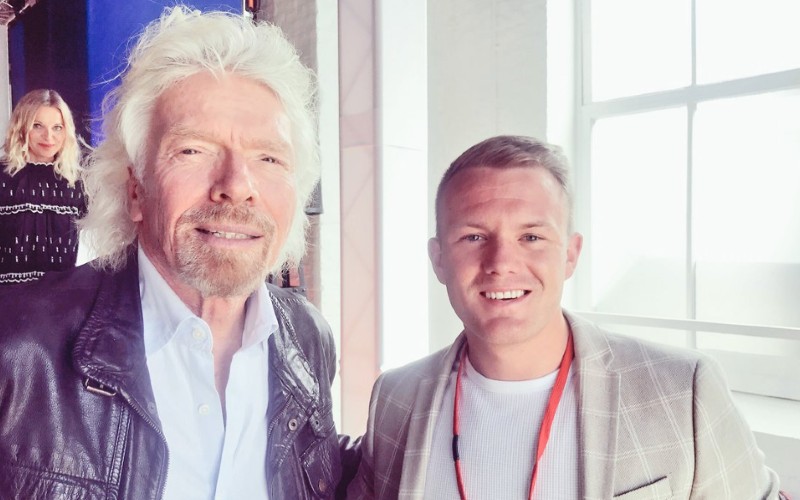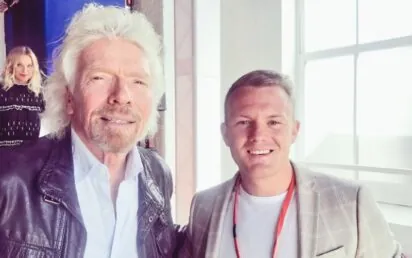From sharing a stage with Sir Richard Branson at 21, to being one of the first guests on Steven Bartlett’s Diary of a CEO podcast; to securing investment from billionaire Nick Candy; Luke Massie is used to making headlines.
This week he made another one when his FinTech business, VibePay, was acquired by global pay by bank platform, Banked.
The 32-year-old entrepreneur will now join the board of Banked as he bids to build VibePay into the ‘Klarna of pay by banking’.
But who is Luke Massie?
He’s spoken in the past about his tough childhood being brought up as one of five children in a Preston council estate and selling sweets to his school mates to make extra money.
“Where you’ve come from isn’t where you’re going,” he said this week. “I did come from a council estate but I don’t think that matters. I don’t want to be known for that. I want to be known for building something that people use.”
At an early age Massie excelled at two things: Football and business.
Growing up Massie the footballer was on the radar of Blackburn, Bolton and Blackpool’s academy systems although, as his business career took off, he dropped into non-league football and represented Bamber Bridge, Lancaster, Coppull and Longridge Town.
While he was 17 and studying for his A Levels at Cardinal Newman College in Preston he set up his first business – Mortgage Claims Direct – with £3,000 he saved up.
Within 11 months the teenager sold the PPI company for £94,000 and Massie was on his way.
Several other projects followed, including an online platform exclusively for students and a Preston loft conversion business, before he set up Vibe Tickets for music lovers to buy and sell spare tickets without fees.
Massie was included in a list of the country’s top 100 young entrepreneurs as Vibe Tickets quickly became the UK’s go to marketplace for secondary tickets.
The startup was quickly turning over £600k but its young founder confidently predicted it would be a £6m turnover business sooner rather than later.
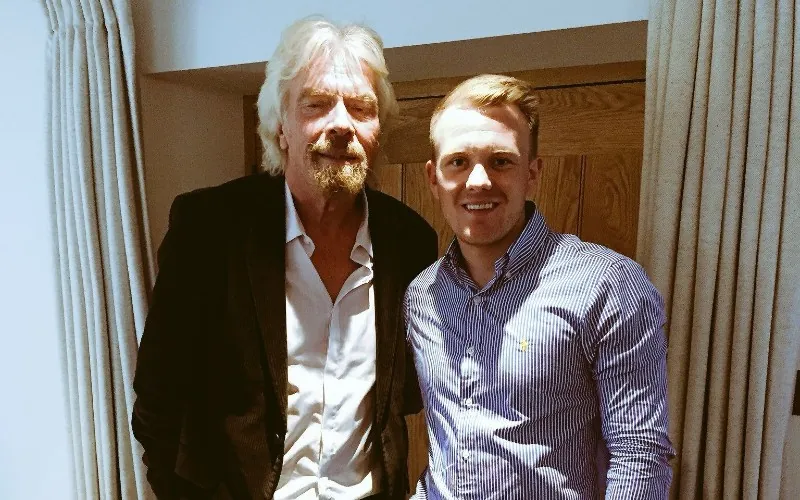
Luke Massie with Sir Richard Branson
He won the backing of high profile entrepreneurs, including Sir Richard Branson, who he met after making it to the final three in the #VOOM 2016 Virgin Media competition, spending the day at the Virgin founder’s house, meeting his team of experts and associates.
It was a life-changing experience and Massie even became the public face of VOOM 2017.
However, a year later, he hit his first significant bump in the road when Vibe Tickets went into administration after plans to raise additional funds did not come to fruition.
The 2018 headline in The Times -‘Branson favourite Luke Massie goes under’ – was especially blunt.
His Lancaster-based ticketing business had raised a total of £1.7m from Matt Newing and his company Elite Telecom; ANS Group founder Scott Fletcher MBE; Vela Technologies Plc; and almost 300 investors on Crowdcube.
As a result of the administration process, Newing and Elite Telecom, Vela Technologies Plc and Fletcher lost £600,000, £400,000 and approximately £500,000 respectively.
Speaking at the time Massie said he was ‘backed into a corner”’ and had no choice but to place the company into administration – and dismissed claims that it was planned as ‘ridiculous’.
Massie insisted he’d got ‘nothing to hide’ after he bought Vibe Tickets out of administration, saying he was deeply hurt at suggestions on social media that he’s ‘planned’ the outcome.
Fletcher even took to LinkedIn in support of Massie, writing: “I was a large investor in Vibe and continue to back Luke – I can say with 100 per cent certainty this wasn’t Luke’s fault other than being naive when he was just 20 and signing up to ridiculous terms via an investment agreement.”
Massie went on to appear on episode 19 of Steven Bartlett’s Diary of a CEO podcast to put his side of the story forward.
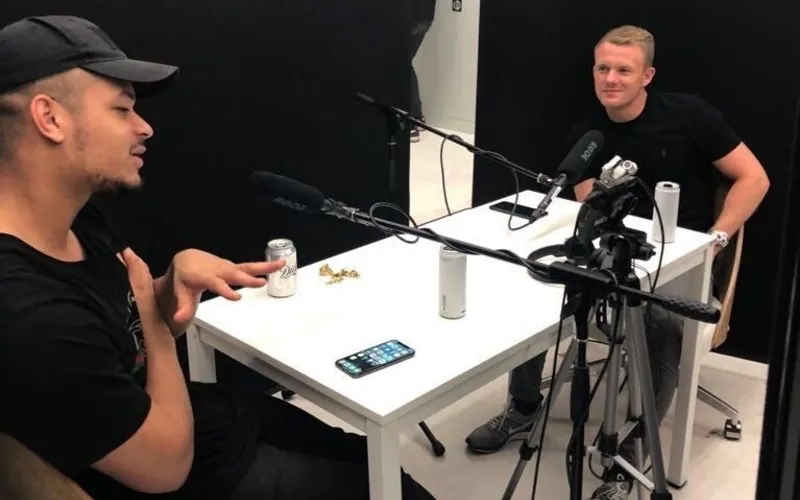
Luke Massie appeared on Steven Bartlett’s Diary of a CEO podcast
Seven years later, I asked Massie how he reflected on that episode in his life. “I’ve not given it too much thought because it happened so long ago,” he said. “That was obviously a low. I was forced into a corner by early investors. It would have resulted in everybody losing. I think I put that behind me and I carried on going.”
After getting up from the canvas, Massie faced an even bigger body blow in 2020 when Covid struck.
“When Covid happened people weren’t even allowed to leave their front doors never mind go to a gig,” he recalled.
As a result the business pivoted away from tickets to creating a payments platform – and so VibePay was born.
VibePay benefited from the advent of open banking and worked by sending and receiving money instantly, with money flowing straight from one bank account to another – removing the middleman.
“VibePay is the UK’s version of Cash App or Venmo,” explained Massie. “We basically allow people to send and receive money directly from their bank accounts instantly and avoid fees.”
VibePay has been backed by billionaire property developer Nick Candy, who recently became the treasurer of Reform UK and is married to actress and musician Holly Valance.
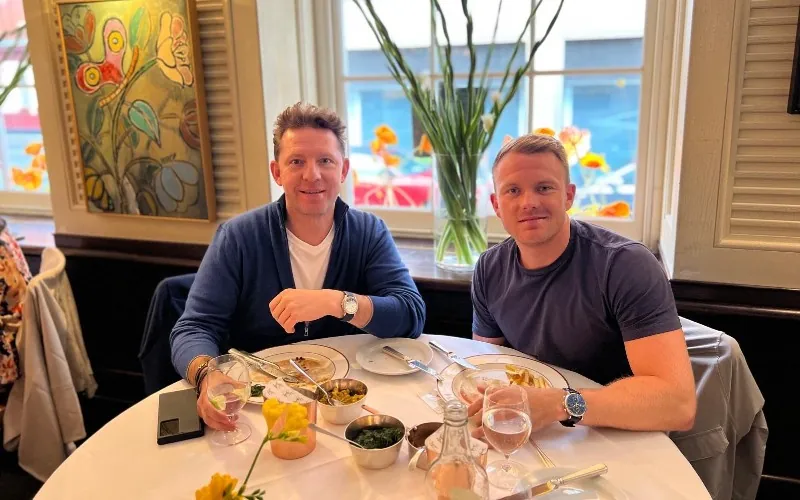
Luke Massie with Nick Candy
Last year Candy was part of a fresh £5m investment raise into VibePay, bringing the total funding raised to date to £12m.
“We’re pretty much the number one payment app in the UK and we’re trying to grow it as quickly as possible and enter new markets,” said Massie. “We’re hoping to really fire that growth.”
With around 250,000 active users, the Holy Grail for VibePay is to become the brand most associated with pay by bank – in the same way Klarna is to the buy now, pay later industry.
Pay by bank is a way to pay and be paid directly from a bank account and is gaining in popularity, especially among the younger Gen Z and Millennial audience.
That’s why Banked’s acquisition of VibePay has the potential to be a game-changer.
“We’re bringing the two businesses together to join forces and take on pay by bank, just as Klarna went on to dominate buy now, pay later,” explained Massie.
“No-one has gone on to own the space with a brand. That’s where Vibe comes in. With Banked’s infrastructure I think Vibe could become the brand that owns pay by bank. That’s what we should be aiming at.
“I’m staying with the company and joining forces with Brad Goodall, CEO of Banked.
“Brad is going to very much focused on the bank relationships. Vibe is going to be led by me and growing it out.
“What this deal really means is with Banked’s technology and infrastructure we can now connect all the dots. Vibe can scale.
“Pay by bank is something that is really growing quick. We have a good chance of bringing the two businesses together and taking it from a $200m business to a $1bn business. That’s the aim.
“Although VibePay is only five years old we’ve been building this brand and this community for quite some time and sometimes you’ve just got to go for it.
“The learning I would say if I was to go again I’d be thinking about global markets first. The UK, although it’s a good market, is tiny compared to the US, Australia and other places. Next time I’d have a bit more global ambition first, especially if you’re in tech.
“I think’s Vibe’s growth could have been a lot bigger if it was a US company.”
Massie identified Matt Moulding, CEO and founder of THG, as one of the entrepreneurs he most admires.
“For me personally it’s business as usual,” he said. “I just want to keep focusing on growing the business. I look up to people like Matt Moulding, who has built THG and has global reach now.
“When The Hut Group bought Myprotein (in 2011) and went on to build a powerhouse, that’s what I see here. Bringing together Banked and Vibe means we now have all the moving parts to create the value from here. We can offer something to the banks, we can offer something to the brand and we can offer something to the end consumer.”
“If I want to get Vibe to a be a £1bn business I’ve got to try and learn from people who’ve been there and done it. I think Matt is one of the UK guys I would look up to.
“The learning is to keep believing in the vision and keep going for it. You’re going to have lows along the way but you’ve got to be really resilient.”

